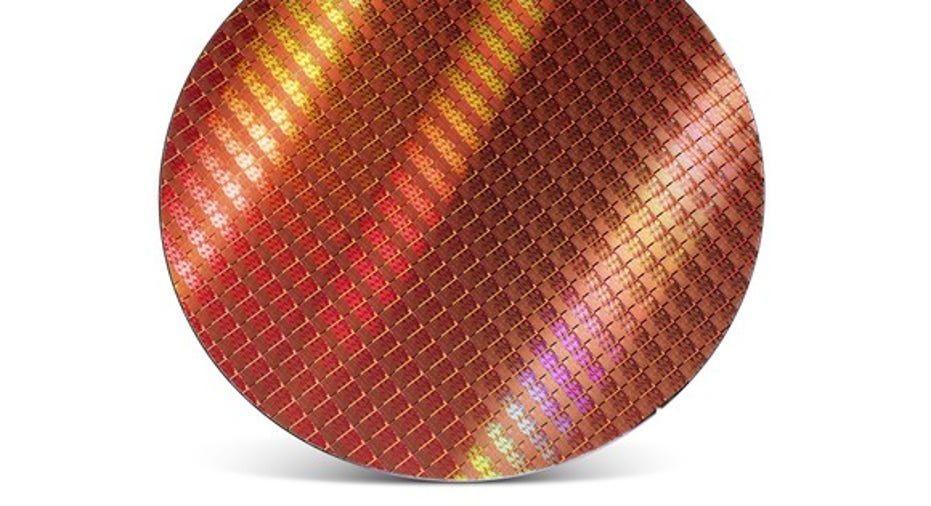Inside Intel Corporation's First Quarter Financial Guidance

On Jan. 26, microprocessor giant Intel (NASDAQ: INTC) said that it expects to generate $14.8 billion of revenue in the first quarter of 2017 (this figure represents the midpoint of the company's guidance range of $14.3 billion to $15.3 billion).
A wafer of Intel chips. Image source: Intel.
That number represents a 7% boost year over year, which certainly isn't bad, but the company did note that this number is "at the lower end of [Intel's] seasonal range."
Weaker product mix expectations
That guidance, Intel CFO Robert Swan said, "reflects an expectation of lower Core brand mix and [average selling prices] coming off a strong holiday selling period for gaming and other premium PC systems."
Remember that Intel's personal computer chip product stack looks like this:
- Core i7 (highest price and performance)
- Core i5
- Core i3
- Pentium
- Celeron (lowest price and performance)
What Swan is saying is that in the first quarter of 2017, the company expects that a larger proportion of personal computer buyers will choose systems using the cheaper Pentium and Celeron processors, rather than the higher-end Core processors.
Digging a little bit deeper into this, CEO Brian Krzanich observed that during the holiday season, "people tend to buy a lot of gaming systems."
Since gaming tends to require much more performance than typical personal computer use cases, buyers looking for gaming-capable computers are generally buying systems with Core processors. Not only that, but Intel builds gaming/enthusiast specific Core i5 and Core i7 chips that command premiums over the "typical" Core i5 and Core i7 chips.
So, to the extent that gaming personal computer demand slows, so too should Intel's personal computer product mix.
Additionally, although management highlighted gaming-oriented computers as a key driver here, management also referred to a decline in sales of "other premium PC systems" as well. I suspect that Intel is talking a lot more about gaming these days as it has become quite a "hot" theme within the semiconductor industry, hence the focus on it in its messaging to investors.
Expectations for the entirety of 2017
Krzanich indicated that the company's strong average selling price performance in 2016 (notebook and desktop average selling prices up 2% year over year) was "mostly, if not in almost every case, all mix shift and [Intel's] customers buying up [the product stack]."
Krzanich indicated that the company is being cautious in its financial guidance about how much more average selling price growth it will see in personal computer chips, but did say that Intel doesn't "see a decline or anything of the average [average selling prices]."
Swan then chimed in, adding that the year-over-year average selling prices in the second half of 2017 "get a little bit tougher" due to the "strong [average selling price] performance throughout the course of 2016."
Changes in the average selling prices for Intel's notebook and desktop platforms. Data source: Intel earnings releases.
Indeed, if we look at the data, Intel saw the year-over-year improvements in desktop chip average selling prices decline throughout 2016, but we see the reverse with respect to notebook average selling prices.
It's important to remember that Intel sells far more notebook processors than it does desktop processors (since notebook computers generally outsell desktop computers), which is likely why Swan indicated that year-over-year average selling price comparisons with respect to Intel's personal computer chip sales will get tougher in the second half of 2017 than they will be in the first half of the year.
10 stocks we like better than Intel When investing geniuses David and Tom Gardner have a stock tip, it can pay to listen. After all, the newsletter they have run for over a decade, Motley Fool Stock Advisor, has tripled the market.*
David and Tom just revealed what they believe are the 10 best stocks for investors to buy right now... and Intel wasn't one of them! That's right -- they think these 10 stocks are even better buys.
Click here to learn about these picks!
*Stock Advisor returns as of January 4, 2017
Ashraf Eassa owns shares of Intel. The Motley Fool recommends Intel. The Motley Fool has a disclosure policy.



















